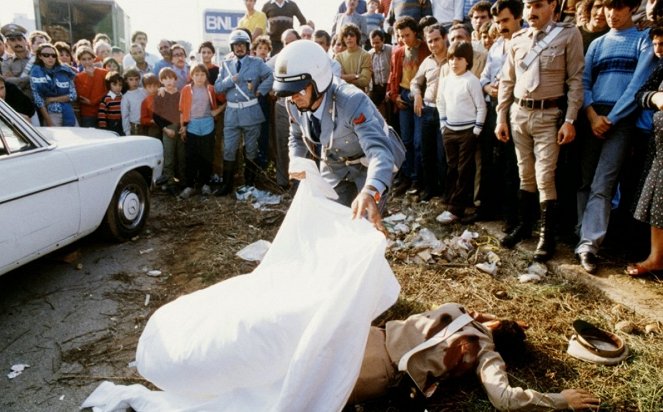Ohjaus:
Giuseppe FerraraKuvaus:
Silvio FraschettiSävellys:
Vittorio GelmettiNäyttelijät:
Lino Ventura, Giuliana de Sio, Stefano Satta Flores, Accursio Di Leo, Lino Troisi, Arnoldo Foà, Adalberto Maria Merli, Andrea Aureli (lisää)Juonikuvaukset(1)
In spring 1982, Carlo Alberto Dalla Chiesa, General of the Carabinieri, has just achieved total victory against terrorism. He is the most popular man in Italy and could settle for a well-earned retirement. He doesn't, however, because in Palermo, rival Mafia families are killing each other and openly scorn the Italian state by murdering a series of government representatives, magistrates, police officers. Dalla Chiesa takes up the challenge and accepts to become the police chief of Palermo. His tactic is surprising: the weapon of denunciation, so effective against terrorism, stalls in Sicily, confronted by the law of silence. He must therefore tear down the veil of fear that masks every face. Dalla Chiesa will fight in daylight, face uncovered, taking every kind of risk. The population begins to have hope. He will succeed, up until... (jakelijan virallinen teksti)
(lisää)Arvostelut (2)
I’m slowly catching up with the era of French crime investigation movies and one essential piece has caught up with me on TV yesterday. Along with it came Lino Ventura whom I’ve seen so little in movies so far that I’d be able to count it on one hand. But I must admit that I was expecting upmost excitement and in the end, I only felt upmost excitement about Lino Ventura. One Hundred Days in Palermo represents an accurate overview of life and Mafia in the 1980s Palermo. It’s actually not making anything up, which makes it so much more difficult to watch. On the other hand, I had a bit of a problem to relate to the characters (especially since – SPOILER – most of them eventually get shot) and so the movie didn’t manage to grow on me too much. But Lino Ventura’s acting performance was certainly unforgettable. I hope that I’ll soon get to see more of his movies because he’s certainly someone that no one can match up to nowadays.
()
Rather than reconstructing events, it acts as a celebration of General Dal Chiesa's legacy and his struggle with mafia-bureaucratic wind mills. It seems more like it was created to arouse passions and force the people and the government to take action, rather than to only watch and do nothing. Which is a tax for the creation barely a few months from the displayed events. Thus, there is a noticeable lack of distance and information (especially in the passages "from the tent of the mafia" and from government circles) and so it is quite general and in the course of footage it pays more and more attention to the melodramatic personal line at the expense of the raw reconstruction, that took place in the first half. But it's not bad in any way. I would just rather see the same material and theme elaborated a few years later (and also with the same team and director) and more in depth. But it would have been without Ventura, and it would be an eternal pity to deprive him of such a grateful and charismatic role.
()
Kuvagalleria (15)
Kuva © Compania Lavoratori del Cinema e del Teatro


Mainos